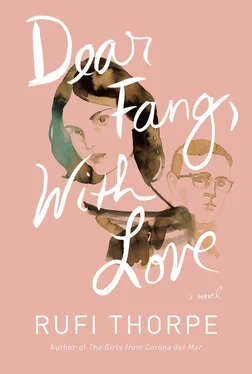I was confused. Sylvia was my grandmother. She couldn’t also be Herkus’s grandmother.
“I didn’t get to this part on the phone,” Justine put in. “I thought I should let Herkus explain in person.”
“During the war, Henryk had escaped,” Herkus explained. “When his family was taken, he was sixteen and in love with a farm girl, so when he escaped from the train — his mother and he had been kept in one of the first-class cabins for some reason, they were separated out, he never knew why — she encouraged him to simply get off at one of the stops. And he did. No one noticed. He just walked right off the train. She said, ‘Will you go buy me some candies?’ And she handed him all the money she had and he went and that was that! But once he was free, where to go? So he went to the farm girl and threw himself on the mercy of her father who was a good man with no sons to work the farm and who let them marry, even though Henryk was a Pole and they were Lithuanian. So he lived out the war working on the farm outside of Vilnius. Do you want another drink?”
“God no,” I said, covering my beer with my hands. “I’ve had too much if you want to know.”
“Oh!” Herkus laughed. “That is okay! Everything is okay tonight! We are family tonight.” He reached over and hugged me, which made me feel like I might cry.
“Anyway,” Justine said, helping Herkus finish the story, “somehow Sylvia in the forests hears that Henryk has survived. Her brother. And one night she arrives at the farm and she brings them a baby. That baby, Sylvia’s daughter, was Herkus’s mother. Henryk and his wife raised it as their own, as their eldest daughter. After her they had other children, of course.”
I was having trouble processing what they were saying. “But whose baby was it?”
“It was her baby,” Herkus said. “Sylvia’s baby that she had in the forest.”
“I think,” Justine added, “the story you told me, that she killed her baby in the woods? I was wondering if maybe this was something she made up to tell her forest husband when really she took the baby to her brother.”
“I think so,” Herkus said, nodding in agreement with Justine.
“But why would she do that?” I asked. I couldn’t tell if I was failing to understand all of this because I was so drunk or because I was only finding it out now while Herkus and Justine had had hours or even days to process it.
“To keep the baby safe!” Herkus said. “Who wants to raise a baby in the forest?”
“What do you mean?” I asked.
“You ask why Sylvia takes — excuse me — took the baby to her brother, and I say I think it is because baby would be safer with her brother than in forest.”
I noticed he had begun dropping his articles, and it made me fond of him, reminded me of Grandma Sylvia, who would do the same whenever she got flustered or passionate. Justine was nodding, sipping some pink drink on ice through a tiny black straw. “But what I don’t understand,” she said, “is why she didn’t stay with Henryk and the family on the farm. Why go back to the forest?”
“Yeah,” Herkus said, smiling and still completely lighthearted, so far away was all this tragic mess from us now, from our little grouping at the bar with our cold glasses of alcohol. “This was always the mystery my mother would talk about — because of course it hurt her, for Sylvia to go back to the forest and not stay with beautiful baby girl. Who would do it?”
I felt like I was dreaming and I didn’t know how to make it stop. Sometimes in my dreams I would begin floating and not be able to get my feet back on the ground — I would just fall to the side, skidding through the air. But of course I remained perfectly upright at the bar. “Maybe the farmer didn’t want to take on another Polish refugee. It would have endangered them, been more conspicuous,” I said.
“No,” Herkus said, “the farmer wanted her to stay, begged her not to go. No one had milk for the little baby, see, and they thought she would not live because she was so small, but then she did live — off goat milk!”
“I see,” I said. I imagined Grandma Sylvia carrying her tiny, undernourished baby through the forest to find her brother. How long would she have had to walk? “Wait,” I said, “where was the farm?”
“Outside of Vilnius maybe fifteen kilometers,” Herkus said. I was ashamed that I was too drunk and frankly too ignorant to be able to do the metric conversion in my head, but it didn’t matter.
“Grandma Sylvia escaped from Stutthof, but she never made it back to Vilnius — she was in the forests outside of Warsaw by the time she was with the Home Army. How could she ever have gotten all the way to Vilnius?”
“She walked,” Herkus said.
“No!” I cried.
Justine nodded. “That has always been part of the story.”
It was impossible to imagine.
“How many miles?” I asked. “I mean, how many kilometers? Between Warsaw and Vilnius?”
Justine and Herkus argued in Lithuanian for a minute, and then Justine said, “Maybe two hundred and fifty miles she walked.”
“But that’s impossible!”
Herkus shrugged. “She said it took her three weeks.”
“All the more of a puzzle as to why she would not stay,” Justine insisted. “Why walk two hundred and fifty miles all the way back?” She used her straw to stab a maraschino cherry that was lost in the bottom of her glass.
I thought for the first time that Grandma Sylvia must have been angry. I had never pictured that part before. The young girl, raped and set free, who would not want to take care of a baby, who would not want to be saved, but who wanted to go back into the forest and kill Nazis. The girl who simply could not bear to just be normal again, who could not fit in on a happy farm with her brother who only knew her as his little sister, not this wild, half-starved, violent thing she had become. Maybe it was a blood vendetta. A chance to avenge her sister. Maybe she just wanted to die.
I had only known Grandma Sylvia when she was an old woman, her past reduced to a series of stories as familiar and safe as episodes from a beloved television show— I Love Lucy, or Gilligan’s Island. I had never understood the rape-birthday cake, but I thought I understood it now. She was not celebrating the rape but the fact that she survived it. To be ninety years old in Southern California, licking the thick lard frosting off a knife as you eat a cake from the supermarket, encrusted with improbable blue roses, talking happily with your daughter about the latest episode of All My Children ! The extravagance and unpredictability of life was beyond comprehension. The memories burned me, were too hot to touch. I didn’t know how to explain all of this to Herkus and Justine in that strange and suddenly very dark bar. When had it gotten so dark?
“Back then,” I said, “she must have been so angry. After the rape, I can imagine that she may not have wanted to survive. Perhaps she was hoping to die in the forests, fighting. She was young, sixteen or seventeen when they were taken. So by this point she must have been — what? Eighteen?”
“She was fourteen when they were taken. Wait, what rape?” Herkus asked.
“Oh,” I said. I explained about the guard at Stutthof, surprised Justine hadn’t already done so. She kept giving me warning glances as I told the story of the SS officer raping her and setting her free, but I wasn’t sure why. I was still reeling from the idea that Grandma Sylvia was only fourteen. I had never pictured her as being fourteen at Stutthof. The way my mother told the story, she had seemed older, in control, the protagonist of the story. It had been because of her great beauty that the guard was overcome. Now it seemed that she was just a child having horrible things done to her. I thought of Chloe, then pushed the memory out of my mind. I thought of Justine’s objection: That Grandma Sylvia could not have been beautiful. That it was something stranger or more sinister than desire that had moved the guard.
Читать дальше












